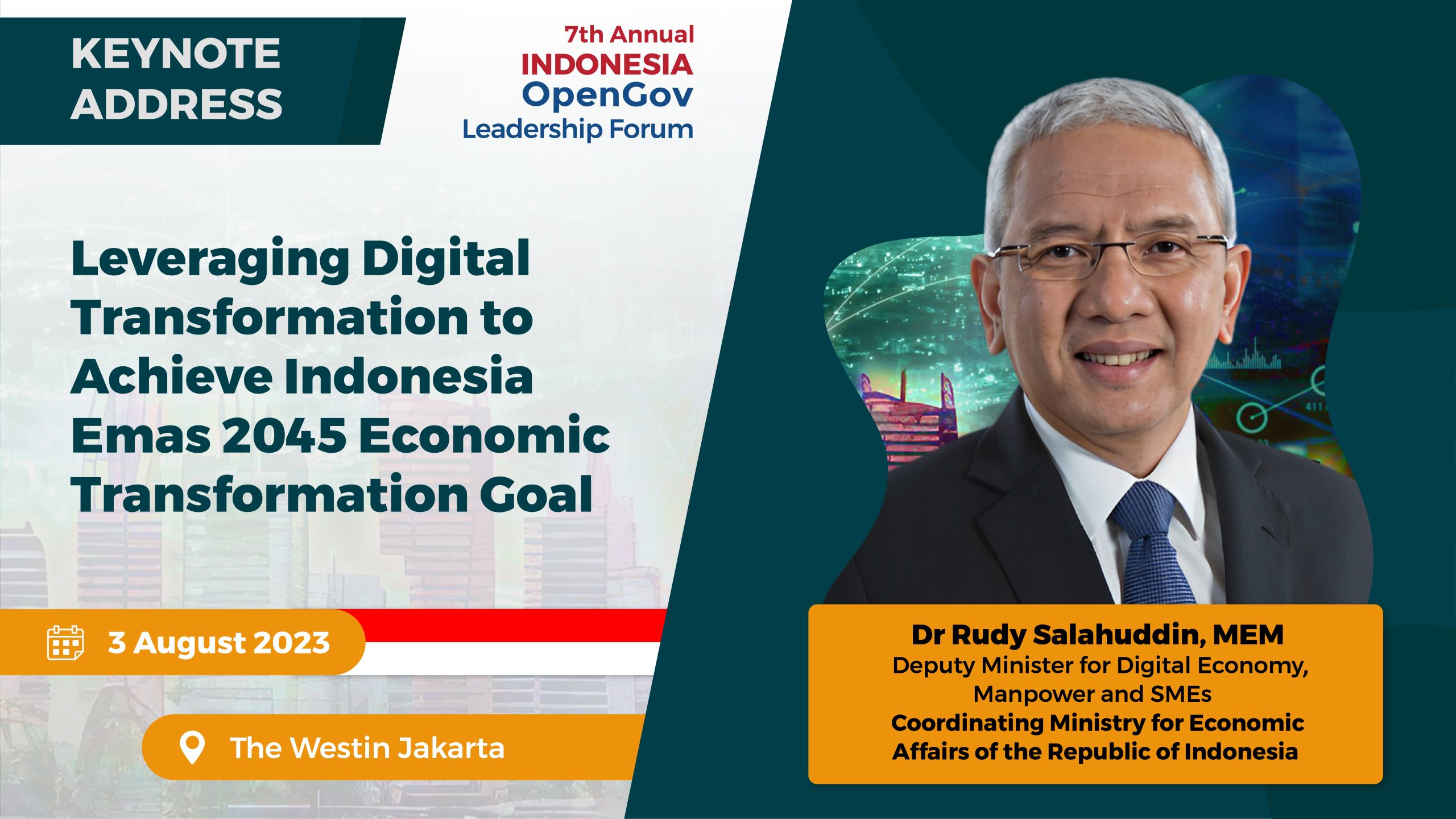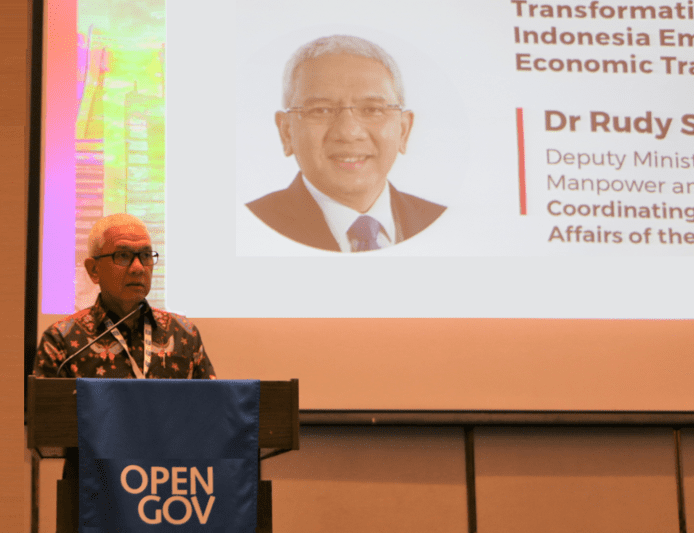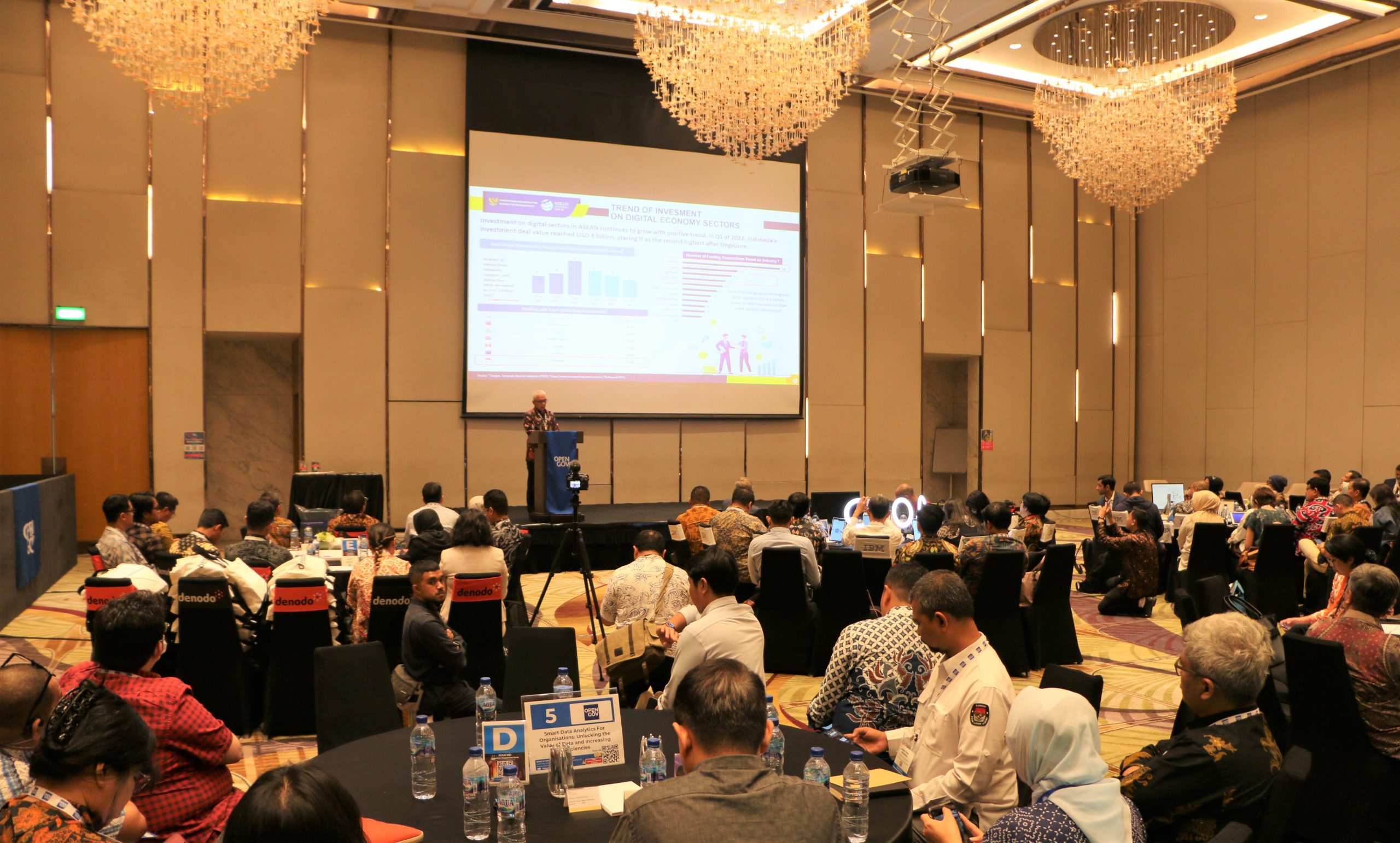
|
Getting your Trinity Audio player ready...
|
Dr Ir Rudy Salahuddin, MEM, Deputy Minister for Digital Economy, Manpower and SMEs, Coordinating Ministry for Economic Affairs of the Republic of Indonesia, congratulated and thanked OpenGov Asia for hosting the 7th Annual OpenGov Indonesia Leadership Forum with the theme “Accelerating Digital Transformation to Achieve Indonesia Emas 2045 Economic Transformation Goal.”
He acknowledged the gathering’s importance, bringing together government officials, industry leaders, and experts from diverse fields such as information technology, cybersecurity, financial services, healthcare, education, and telecommunication. Collective discussions on digital transformation efforts across all sectors are crucial for driving Indonesia’s progress and development.
 Indonesia’s current focus is accelerating the digital transformation to achieve the vision and goals of Indonesia Emas 2045, the country’s vision of becoming a developed, high-income economy by 2045. He emphasised that accelerating digital transformation is essential to achieving the ambitious economic transformation goals of “Indonesia Emas 2045.” With a booming digital economy and the potential for exponential growth, Indonesia aims to lead the way in the ASEAN region and beyond.
Indonesia’s current focus is accelerating the digital transformation to achieve the vision and goals of Indonesia Emas 2045, the country’s vision of becoming a developed, high-income economy by 2045. He emphasised that accelerating digital transformation is essential to achieving the ambitious economic transformation goals of “Indonesia Emas 2045.” With a booming digital economy and the potential for exponential growth, Indonesia aims to lead the way in the ASEAN region and beyond.
“The world is increasingly interconnected, largely due to digital technologies,” said Dr Ir. Rudy Salahuddin. “But it also confronts mounting uncertainties, ranging from the pandemic, supply chain disruptions, major power rivalries, to recent global security and inflation concerns.”
In this context, innovation and creativity are vital. Digital innovation occurs when digital technologies provide solutions that contribute to improved well-being and achieve specific goals. The rapid adoption of digital technology has significant implications for developing the digital economy, particularly in the ASEAN region.
The ASEAN region has witnessed remarkable growth, particularly in its digital economy, projected to reach USD 1 trillion by 2030. Indonesia plays a significant role in this growth, contributing 40% of ASEAN’s digital economy market spending.
The country’s digital economy value is expected to surge from USD 77 billion in 2022 to USD 360 billion in 2030, driven by a thriving start-up ecosystem and favourable investment trends.
Furthermore, investment in Indonesia’s digital economy sector has shown positive growth, with the investment deal value reaching USD 3 billion in the first quarter of 2022, positioning it as the second-highest in the ASEAN region after Singapore.
The rapid advancement of the digital economy is also evident in the thriving start-up ecosystem,” explained Dr Ir. Rudy Salahuddin. “Indonesia has more than 2,400 start-ups, ranking it sixth globally for the highest number of start-ups in a country.”
The country has a large labour force, demographic bonuses, strategic geopolitical location, and abundant natural resources. By 2045, Indonesia aims to celebrate its centennial with a vision to become a high-income economy and one of the world’s most developed countries, aiming to rank among the 5-7 largest economies globally.
Despite the progress made, Indonesia acknowledges several challenges, including the need to establish high-speed and inclusive internet access through advanced connectivity solutions, enhance human resource productivity by promoting digital literacy and nurturing digital talent, and strengthen cybersecurity through increased awareness.
Furthermore, given the dynamic nature of future challenges, Indonesia acknowledges the imperative for continuous adaptability and preparedness. Consequently, the nation recognises the need to adopt a transformative approach to shaping its future, ensuring it remains agile and resilient in the face of evolving circumstances and technological advancements.
 To achieve its ambitious Indonesia Emas 2045 goals, it must embrace technology as an essential economic growth and development driver. Accelerating the digital economy through innovation and technology is a priority, along with nurturing digital talent through various programmes. These strategic interventions aim to cultivate a skilled workforce and nurture visionary leaders, driving Indonesia’s progress in the digital era.
To achieve its ambitious Indonesia Emas 2045 goals, it must embrace technology as an essential economic growth and development driver. Accelerating the digital economy through innovation and technology is a priority, along with nurturing digital talent through various programmes. These strategic interventions aim to cultivate a skilled workforce and nurture visionary leaders, driving Indonesia’s progress in the digital era.
Dr Ir Rudy emphasises the importance of technology training to enable workers’ participation in the digital economy. Training is essential for developing skilled workers capable of creating software and digital products, which are crucial for economic growth. Furthermore, vocational programmes equip individuals with the skills to secure jobs in the expanding digital economy, fostering economic development and inclusivity.
The government has taken significant steps to bolster digital talent and entrepreneurship, playing a pivotal role in realising the vision. Initiatives such as Kartu Prakerja and the “Gerakan Literasi Digital Nasional” have been introduced to the general public. At the same time, Digital Talent Scholarships cater to professionals, and the Digital Leadership Academy empowers leaders in the digital domain.
According to Dr Ir Rudy, by proactively addressing the evolving landscape of digital innovation, Indonesia can create an enabling environment that fosters technological advancement and safeguards the interests of its citizens and businesses.
Collaboration and cooperation between stakeholders, including government, businesses, and industries, are essential in the fast-paced technological landscape. Joint infrastructure development and human resources efforts are vital pillars in advancing the digital economy.
Dr Ir Rudy Salahuddin emphasised that achieving Indonesia Emas 2045 requires collective efforts, and the path towards a prosperous and technologically advanced Indonesia starts with the acceleration of digital transformation.
Through strategic steps and multi-sectoral cooperation, digital transformation can propel Indonesia towards achieving its vision of Indonesia Emas 2045. With a thriving digital economy, the country stands poised to become a leading force in the region and a beacon of digital innovation for the world.
Both the public and private sectors must prioritise cooperation to tackle the challenges of rapid technological development in the digital era. Cross-sectoral and international partnerships are crucial in this rapidly advancing technological landscape, ensuring better and sustainable progress.
“Continuous collaboration enables the sharing of knowledge, resources, and expertise among various parties, expediting the development of innovative and relevant solutions.” Dr Ir. Rudy says. “The emergence of new ideas and technological breakthroughs can be more easily achieved when various stakeholders unite to tackle challenges.”
Moreover, the development of digital technology demands a multifaceted, multicountry approach, anticipating the future with a range of instruments such as well-crafted programmes, effective policies, and comprehensive regulations.
“As nations become increasingly interdependent, digital technology issues often transcend national boundaries, necessitating effective solutions that require international cooperation,” Dr Ir Rudy Salahuddin observes. “By jointly setting international standards and principles, countries can promote the responsible use of technology and minimise potential risks in digital technology.”
Cross-border cooperation is crucial for resolving digital technology-related issues and promoting sustainable growth in the global technology ecosystem. Better understanding and collaboration between countries can lead to effective solutions in this rapidly advancing digital era.
Dr Ir Rudy Salahuddin acknowledges that the gathering presents a valuable opportunity to come together, engage in meaningful discussions, share knowledge, and collaboratively devise strategic steps towards leveraging digital transformation to benefit multiple sectors and positively impact all stakeholders.
He expressed his gratitude to all the distinguished guests and participants for their valuable presence and contributions and thanked them in advance for their insights, support, and contributions to achieving Indonesia Emas 2045.
“Through a collective and innovative approach, we can unlock the full potential of digital technologies to drive economic growth, enhance public services, and improve the overall well-being of our society,” he concludes.
















